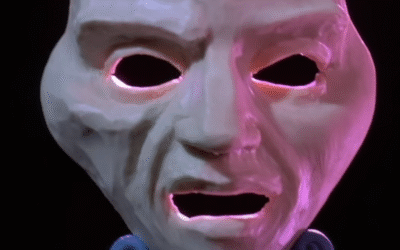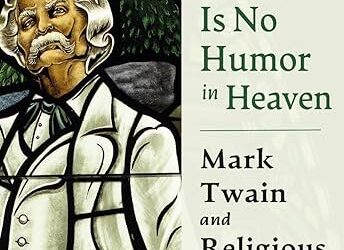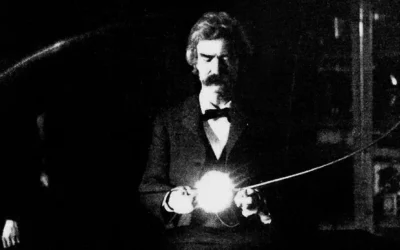The 2025 Park Church Summer Lecture Series presented by the Center for Mark Twain Studies (CMTS) begins at 7:00 p.m., Wednesday, July 16 at the historic Park Church, known for its architecture and connection to Mark Twain and his close family and friends. Located at 208 W. Gray Street, the lectures are free and open to the public and recordings of the lectures will be posted to the CMTS website.
The Park Church Lecture Series is sponsored by CMTS and Park Church. The Trouble Begins and The Park Church Summer Lecture Series are made possible by the support of the Mark Twain Foundation and generous gifts from individual donors.
The last lecture, “Beyond Mental Telegraphy: Twain’s Late Psychological Fiction” will be presented by Thomas W. Howard, Assistant Professor of Humanities at Bilkent University in Ankara, Turkey.

Image originally published in Century Magazine (April 1895). Clemens is holding Nikola Tesla’s experimental vacuum lamp. Tesla’s face is visible in the background.
What would it mean to read Mark Twain’s late fiction as psychological experimentation? Twain’s fascination with thought-transference, habit formation, and other late nineteenth-century psychological theories has been well studied. Recent scholarship has revealed how Twain incorporates such theories into his fiction—habit formation in Adventures of Huckleberry Finn; mental maps in Life on the Mississippi—but I argue that Twain’s later fiction goes further. By transforming psychological theories into narrative experiments, Twain challenges readers’ assumptions about consciousness and identity. Centering Pudd’nhead Wilson and Those Extraordinary Twins, I suggest that Twain deploys nineteenth-century ideas of the double brain into his text. Twinned and conjoined characters, for instance, reflect deeper concerns about mental duality and the divided self. The dual structure of the text further complicates any singular narrative, requiring significant effort from the reader to trace multiple suggested paths through the story. I argue that this conjoined text is a twinned story that Twain creates to disrupt linear storytelling, allowing readers to navigate layered and shifting interpretations. Ultimately, I suggest that Twain’s late fiction has a significant place in the emerging field of psychology, revealing how his fictional “experiments”—transforming readers into participants in psychological research—contributes to broader cultural conversations about mental life in the pre-Freudian United States. His late works suggest that literature served (and continues to serve) as an essential laboratory for testing ideas about the mind.

Thomas W. Howard
Thomas W. Howard is an Assistant Professor of Humanities at Bilkent University (Ankara, Turkey). His research focuses on nineteenth-century American literature and science as well as the environmental humanities. His current book project, Aphoristic Science: Ecology, Psychology, and Nineteenth-Century Literature, uncovers an open-ended aphoristic style in the emergence of transatlantic scientific methods, especially among the American Transcendentalists and Pragmatists. His work has been published or is forthcoming in Nineteenth-Century Literature, ISLE: Interdisciplinary Studies in Literature and Environment, and Green Letters: Studies in Ecocriticism. As a 2025 Quarry Farm Fellow, Thomas will investigate Twain’s No. 44, The Mysterious Stranger as a literary laboratory of psychological research.
About The Trouble Begins Lecture Series – In 1984, the Elmira College Center for Mark Twain Studies initiated a lecture series, The Trouble Begins lecture series. The title came from the handbill advertising Mark Twain’s October 2, 1866 lecture presented at Maguire’s Academy of Music in San Francisco. The first lectures were presented in 1985. By invitation, Mark Twain scholars present lectures in the fall and spring of each year, in the Barn at Quarry Farm or on Elmira College’s campus. In 2016, CMTS expanded the series, creating the Park Church Summer Lectures Series. All lectures are free and open to the public.





0 Comments